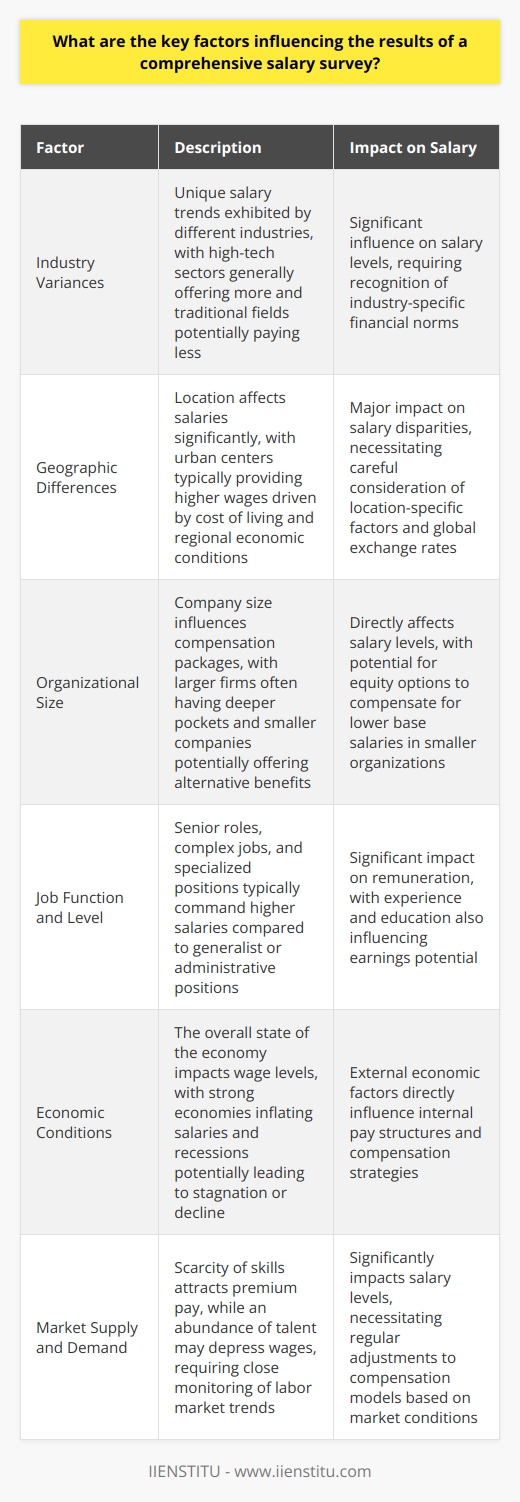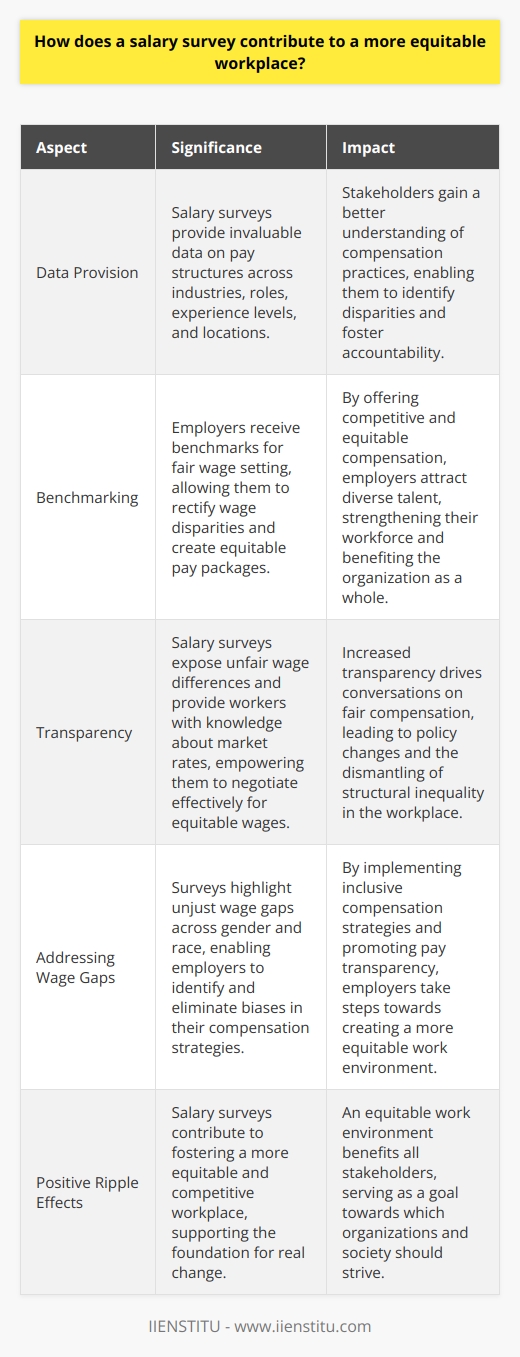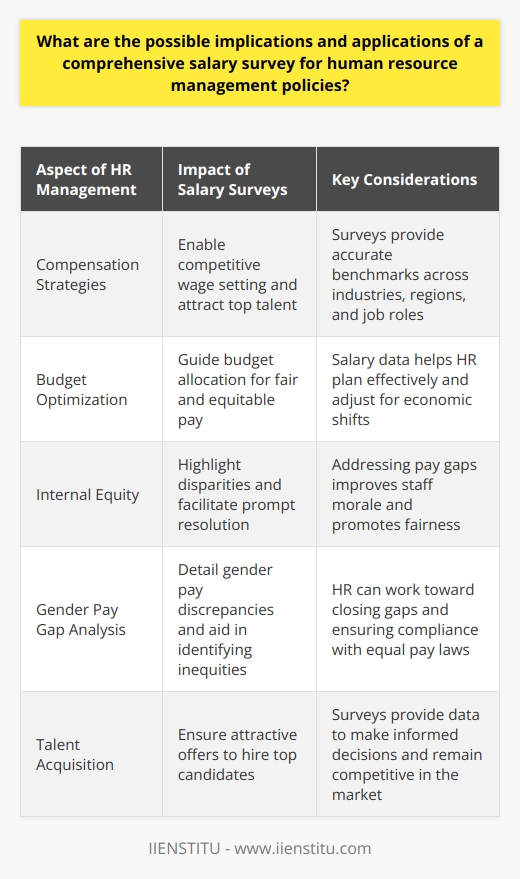
In the intricate sphere of business management, salary surveys are invaluable tools that serve as a compass for a company's financial compass. Essentially, a salary survey is a systematic collection and analysis of compensation data, including wages, salaries, and benefits. It provides a snapshot of current market trends and a rich bedrock of information for businesses aiming to maintain competitive edges.
This analysis resonates at the core of various business functions, harmonizing disparate elements such as talent acquisition, employee satisfaction, financial planning, and overall organizational health.
The Relevance and Importance of Conducting Salary Surveys
Understanding the need for salary surveys in HR functions
A fundamental element in human capital management is fair and competitive compensation. A human resources certification course often emphasizes this principle, illustrating how a well-conducted salary survey ensures that employee pay packages meet or exceed industry standards. By remaining competitive, businesses are in a better position to attract top-tier talent and retain high-performing employees. An ongoing assessment of compensation trends through salary surveys is thus not a luxury but an imperative for HR departments.
Role in retaining and attracting talent
Salary surveys are the backbone in constructing a robust compensation framework that speaks both to the aspirations of prospective candidates and the loyalty of current employees. Companies that disregard these insights risk hemorrhages in talent retention and may find themselves relegated to the unwelcomed position of a training ground for competitors. The diametric results of increased employee turnover and decreased attractiveness to potential candidates underscore the integral role of salary surveys in HR strategies.
Discussing how salary surveys impact strategic business decisions
From a broader strategic perspective, salary surveys predicate the foundation for judicious budget planning. They enable projections and financial blueprints that align with market realities, thus avoiding over or underestimations in wage allocations. Furthermore, astute analysis of salary data influences a company's profitability and long-term sustainability by allowing for informed decisions on pay structures that not only inspire performance but also circumvent financial imprudence.
Types of Salary Surveys
Primary Salary Surveys
Primary salary surveys are designed specifically according to the unique requirements of the commissioning organization. They afford the opportunity to tailor questions directly relevant to the positions and sectors of interest. Conducting a primary survey affords companies confidential and proprietary data, which could be instrumental when dealing with niche roles or specialized industries. Examples include in-house surveys or those conducted for exclusive corporate consortia.
Secondary Salary Surveys
Conversely, secondary salary surveys employ previously collected data sources, such as government reports or industry publications. These are particularly useful for SMEs that might not have the resources to conduct large-scale primary surveys. Scenarios for leveraging secondary salary surveys include benchmarking exercises or preliminary market scans conducted by startups to gain a foothold in determining initial pay scales.
Process of Conducting a Salary Survey
Planning and Designing
A methodical approach to planning and designing a salary survey can prevent foreseeable complications. Key to this phase is establishing clear objectives that align with strategic HR goals. Additionally, formulating pertinent and concise survey questions draws the line between gathering actionable insights and accumulating superfluous data that clouds judgment.
Data Collection
The integrity of a salary survey hinges on the robustness of its data collection methods. Whether opting for direct questionnaires, interviews, or online databases, each method carries its inherent advantages and limitations. Moreover, understanding the implications of sample selection and the potential impact of bias is crucial in ensuring that the results are representative and thus, valid.
Data Analysis and Interpretation
Once data collection is complete, the focus shifts toward analysis and interpretation. Techniques can range from basic descriptive statistics to more complex multivariate analysis, depending on the survey's objectives and the richness of the data. The critical factor is the ability to delineate meaningful patterns and trends from the raw numbers, thereby converting quantitative measurements into qualitative insights.
Challenges in Conducting Salary Surveys and Possible Solutions
Identifying common issues in carrying out salary surveys
While salary surveys are indispensable, they are not immune to challenges. One prevalent issue is ensuring data privacy, which has become increasingly complex in the digital age. Additionally, salary surveys often grapple with the impediment of inaccurate or incomplete data submissions, which can skew results and misinform decision-making processes.
Proposing solutions to overcome these challenges
To mitigate such challenges, transparent communication regarding the utilization and confidentiality of data can alleviate privacy concerns. Good practice guidelines and the implementation of strict data governance standards can further enforce trust. As for data quality, meticulous cross-verification protocols and incentivizing complete and accurate participation can ameliorate the quality of survey responses.
In summary, salary surveys are compelling quantifiers of the value exchanged within the employment marketplace, undeniably influencing the dynamics of modern business. They support HR functions, guide strategic decision-making, and underpin the equilibrium between employee satisfaction and fiscal prudence. Continual refinement of salary survey methodologies is imperative, bolstering their accuracy and utility. As businesses gaze into the ever-shifting constellation of market wages, salary surveys remain the telescopic lens that brings clarity to the remunerative landscape.
Frequently Asked Questions
What are the key factors influencing the results of a comprehensive salary survey?
Key Factors in Salary Survey Results
Industry Variances
Industries differ markedly. They exhibit unique salary trends. High-tech sectors generally offer more. Conversely, traditional fields may pay less. Recognize industry-specific financial norms.
Geographic Differences
Location affects salaries significantly. Urban centers typically provide higher wages. Cost of living drives these disparities. Consider regional economic conditions carefully. Exchange rates also play a role globally.
Organizational Size
Big companies often have deeper pockets. They can afford competitive compensation packages. Smaller firms might offer less cash. However, they may provide other benefits. Equity options could compensate for smaller salaries.
Job Function and Level
Senior roles command higher salaries. Job complexity necessitates greater remuneration. Specialists usually earn more than generalists. Technical positions might outpace administrative ones in pay.
Experience and Education
More experience often correlates with higher pay. Advanced education can also boost earnings. However, diminishing returns can apply eventually. Consider the relevance of qualifications to job performance.
Economic Conditions
The economy impacts wage levels. A strong economy can inflate salaries. In recession, wages may stagnate or decline. External economic factors influence internal pay structures.
Market Supply and Demand
Scarce skills attract premium pay. Abundance of talent might depress wages. Monitor the labor market closely. Adjust compensation models accordingly.
Company Performance
Successful firms tend to reward employees more. Struggling entities may freeze or cut salaries. Financial health significantly guides compensation strategy.
Legislative Influences
Minimum wage laws set baselines. Labor unions may negotiate higher wages. Regulations can affect pay scales. Stay informed about relevant legislation changes.
Comparability and Equity
Companies aim for internal pay equity. External competitiveness is also a concern. Surveys must reflect internal and external fairness. This promotes a balanced remuneration approach.
Data Quality
Accurate salary survey results rely on robust data. Ensure data sources are reliable. Invalid data skews salary survey outcomes. Quality control is paramount in data collection.
Survey Scope and Methodology
Clearly define the survey's scope. Include relevant job titles and descriptions. The methodology determines data relevancy. Ensure consistency in survey execution. This ensures meaningful comparisons.
By focusing on these factors, one can accurately analyze salary survey outcomes. Each element individually influences the remuneration landscape. Together, they provide a comprehensive picture of salary standards.

How does a salary survey contribute to a more equitable workplace?
Salary Surveys and Workplace Equity
Salary surveys serve as critical tools. They provide invaluable data. Stakeholders understand pay structures better. Surveys reveal disparities in compensation practices. They bring transparency to remuneration systems. Transparency fosters accountability in organizations.
Surveys compare salaries across various dimensions. These include industry, role, experience, and location. Employers receive benchmarks for fair wage setting. This awareness helps rectify wage disparities. Salary surveys hence level the playing field.
Transparency Through Data
Salary surveys shine light on hidden issues. They expose unfair wage differences. Workers gain knowledge about market rates. Armed with data, they negotiate effectively. They push for equitable wages confidently.
Employers use surveys to attract talent. Fair pay packages become possible. Employers craft competitive, equitable offers. They thus uphold fairness. This attracts diverse talent. A diverse workforce strengthens the business. Everyone benefits.
Addressing Wage Gaps
Salary surveys pinpoint unjust wage gaps. They highlight differences across gender and race. Employers see where inequity lurks. They set strategies to eliminate biases. They aim for inclusive compensation strategies.
Pay transparency goes hand in hand with equity. It exposes systemic issues in pay. It drives conversation on fair compensation. Policy changes often follow such revelations. Thus, structural inequality begins to crumble.
Positive Ripple Effects
Employees feel valued.
Employers build trust within their teams.
Collective morale improves.
High morale boosts productivity.
Productivity enhances overall company performance.
In conclusion, salary surveys contribute immensely. They foster a more equitable, competitive workplace. They support the foundation for real change. An equitable work environment benefits all. It is the goal towards which we strive.

What are the possible implications and applications of a comprehensive salary survey for human resource management policies?
Understanding Salary Surveys
Salary surveys compile comprehensive data on compensation. They collect information across industries, regions, and job roles. These tools are key for strategic HR management.
Informed Compensation Strategies
Human resources rely on accurate salary benchmarks. Surveys supply this data. They enable competitive wage setting. Thus, they help attract and retain talent.
Budget Optimization
Salary data guide budget allocation. HR can plan better. They ensure fair, equitable pay. They adjust for economic shifts.
Policy Development
Surveys inform policy creation. They reflect market trends. Policies then align with current standards. This alignment is vital.
Internal Equity
Salary data highlight disparities. HR can address them promptly. They strive for internal equity. Fairness improves staff morale.
External Competitiveness
Organizations must stay competitive. Surveys show where they stand. They can adjust salaries accordingly. They remain attractive to candidates.
Gender Pay Gap Analysis
Surveys detail gender pay discrepancies. They aid in identifying inequities. HR can work toward closing gaps.
Performance Incentives
Data demonstrate market-rate incentives. HR can create compelling bonus structures. They align rewards with performance aptly.
Training and Development
Surveys indicate skills premiums. HR sees which skills command higher pay. They invest in employee training strategically.
Union Negotiations
Union representatives demand fair wages. Surveys provide factual grounds for discussions. They support amicable negotiations.
Legislative Compliance
Laws often mandate equal pay. Salary data help companies comply. Non-compliance risks are thus mitigated.
Geographical Adjustments
HR must consider location. Cost of living differs. Surveys assist in fair geographic pay adjustments.
Talent Acquisition
Attracting the right talent is key. Salary surveys ensure attractive offers. They aid in hiring top candidates.
Restructuring Decisions
Changing organizational structures impact salaries. Data inform restructuring impacts. They guide equitable salary adjustments during changes.
Salary surveys hold vast potential. They touch every aspect of compensation management. HR policies benefit greatly from them. Informed decisions promote organizational health. Equity and competitiveness thrive on data. Comprehensive salary surveys are indispensable for robust HR management.



